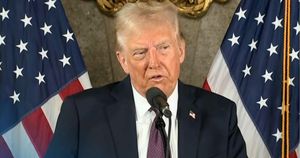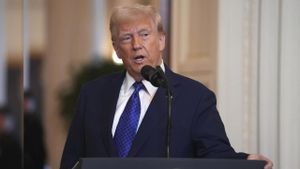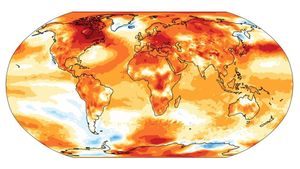Mass protests against the collaboration between the Christian Democratic Union (CDU), Christian Social Union (CSU), and the far-right Alternative for Germany (AfD) party erupted across Germany, drawing hundreds of thousands of demonstrators. The protests, particularly concentrated in Berlin, reflect widespread public outrage over recent votes aimed at tightening immigration policies, marking what many see as a significant political shift.
On February 2, 2023, Berlin alone witnessed demonstrations with police estimates suggestively placing around 160,000 attendees on the streets. Organizers claimed the number was even greater, stating about 250,000 people participated. Protests also spread to numerous other cities, including Saarbruecken, Kiel, and Leipzig, contributing to a nationwide turnout of nearly 700,000 demonstrators, according to the organization Campact.
Publicist Michel Friedman, who recently resigned from the CDU to protest the party's collaboration with the AfD, became a vocal figure at these protests. He condemned the AfD as "a party of hatred" and described the decision by CDU and CSU to vote alongside them as "an unforgivable mistake." His statements highlighted the gravity of the situation, where many feel traditional political norms are being violated.
This wave of protests was triggered by a controversial resolution passed by the Bundestag, Germany's federal parliament, which called for permanent border controls and allowed for the return of undocumented individuals—essentially blocking asylum seekers from entering the country. This resolution was significantly supported by votes from the previously isolated AfD, something the Social Democratic Party (SPD) and the Greens labeled as breaking long-standing political taboos against allying with such extremism.
Friedman’s remarks struck a chord with the protesters, many of whom gathered outside the Bundestag, calling for political parties to protect democracy. "We want our voices to be heard loud and clear; we urge political parties, who call themselves 'democratic,' to safeguard this democracy," Friedman stated during the rallies.
These protests not only criticized the actions of the CDU and CSU but also served as broader condemnation of rising xenophobia and racism associated with the AfD's influence on mainstream politics. Similar large-scale protests occurred over the weekend across major German cities, including Hamburg—where approximately 65,000 joined the demonstrations—and other locations like Essen, where around 14,000 gathered.
Reports from the police noted tens of thousands participating, with many voicing their concerns against the direction of immigration policies under the current government. This mass mobilization was not merely about immediate political decisions but reflected deep-seated anxieties over the eventual rise of far-right ideologies.
Critics of the recent vote also include prominent political figures who expressed outrage over the newfound alliances. Foreign Minister Annalena Baerbock criticized the breaking of the 'sanitary cordon' against extreme right politics as shameful. The SPD and the Greens stated such actions could lead to long-term damage to the political fabric of Germany.
Friedrich Merz, the leader of the CDU, has faced backlash for aligning the party with the AfD, with previous agreements and social norms established since World War II against cooperating with far-right groups now seemingly disregarded. While Merz justified the move as necessary for national security, the backlash has raised questions about the future of the party and its moral standing within German politics.
Protesters have vowed to keep the pressure on the CDU and CSU as the political climate heats up leading to the upcoming federal elections on February 23. Many view the collaborative vote as indicative of broader, concerning trends within German politics, challenging the long-standing centrist democracy.
Overall, the protests epitomize the deep divides within Germany and the potential consequences of shifting political alliances. Voices of dissent now echo louder than ever as citizens mobilize against what they perceive as dangerous alliances forming at the highest levels of government.
People across Germany are rallying to safeguard democratic values against the backdrop of rising populism. The discussion surrounding immigration, democracy, and rights is far from over and will take center stage as voters approach the polls and demand accountability from their representatives.



